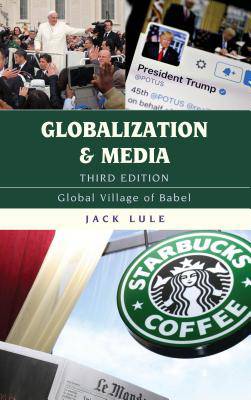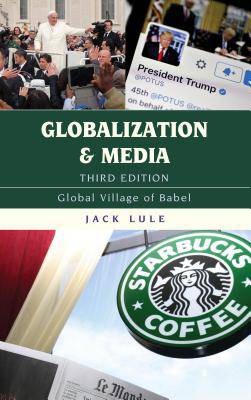
- Afhalen na 1 uur in een winkel met voorraad
- Gratis thuislevering in België vanaf € 30
- Ruim aanbod met 7 miljoen producten
- Afhalen na 1 uur in een winkel met voorraad
- Gratis thuislevering in België vanaf € 30
- Ruim aanbod met 7 miljoen producten
Zoeken
€ 96,45
+ 192 punten
Uitvoering
Omschrijving
The fully updated third edition of this lively and accessible book argues for the central role of media in understanding globalization. Indeed, Jack Lule convincingly shows that globalization could not have occurred without media. From earliest times, humans have used media to explore, settle, and globalize their world. In our day, media has made the world progressively "smaller" as nations and cultures come into increasing contact. Decades ago Marshall McLuhan prophesied that media technology would transform the world into a "global village." Slowly, fitfully, his vision is being fulfilled. The global village, however, is not the blissful utopia that McLuhan predicted. Nor, in a more modern formulation, is the world flat, with playing fields leveled and opportunities for all. Instead, Lule argues, globalization and media are combining to create a divided world of gated communities and ghettos, borders and boundaries, suffering and surfeit, beauty and decay, surveillance and violence. By breaking down the economic, cultural, and political impact of media, and through a rich set of case studies from around the globe, the author describes a global village of Babel-invoking the biblical town punished for its vanity by seeing its citizens scattered, its language confounded, and its destiny shaped by strife.
Specificaties
Betrokkenen
- Auteur(s):
- Uitgeverij:
Inhoud
- Aantal bladzijden:
- 220
- Taal:
- Engels
- Reeks:
Eigenschappen
- Productcode (EAN):
- 9781538106266
- Verschijningsdatum:
- 17/11/2017
- Uitvoering:
- Hardcover
- Formaat:
- Genaaid
- Afmetingen:
- 152 mm x 229 mm
- Gewicht:
- 494 g

Alleen bij Standaard Boekhandel
+ 192 punten op je klantenkaart van Standaard Boekhandel
Beoordelingen
We publiceren alleen reviews die voldoen aan de voorwaarden voor reviews. Bekijk onze voorwaarden voor reviews.











